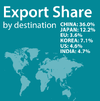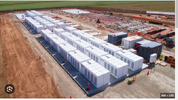- Joined
- 28 August 2022
- Posts
- 7,122
- Reactions
- 11,575
Magic, spot on. My eldest son who wanted out of schhol at 16 got into a TAFE course that had 9 trads in it. He got his chance with the local Shire as a Heavy Diesel Fitter. From there had various jobs with the big companies and has now been in Tom Price for 20 years. A variety of positins which has given him many arrows for the quiver. Highly skilled.Thing is, unskilled people can be trained.
Someone who's trying to make ends meet in whatever low end service industry job could indeed be trained to become an operator, tradie or even a white collar professional if given sufficient opportunity both for the training and ongoing employment thereafter.
If we look at how we used to train tradies (always known as tradesmen back then but that term's deemed sexist today) then there were basically 4 groups. From largest to smallest:
1. Big companies that manufactured, refined or processed something.
2. Utilities especially the state owned electricity authorities.
3. Various other things run by government - the Transport Department, the Housing Commission, public transport fleets, etc.
4. A relatively smaller number trained by private contractors, builders, self-employed tradies with an apprentice, etc.
I'm less familiar with the companies in other states but if you find any group of older tradies in Tasmania and ask them where they did their apprenticeship then the answers will mostly be a list of big business acronyms and things run by government. APPM, Tioxide, ANM, EZ, TEMCO, Comalco, Sheridan, ACI, Incat, Cadbury and so on for the big companies, the Hydro in the next category as an entity unto itself albeit ultimately government owned, and in third category the various state government departments. The remaining 20% would be from the assorted builders, contractors, self-employed tradies and so on.
A key point being they all saw training as something that they needed to be doing and trained far more people than they needed to retain. That's what kept society supplied with tradies who then went to work for themselves or small business.
Part of that was multiple parties working cooperatively to make it work. Apprentices with anything run by government were commonly placed with privately run businesses, typically construction related, for a period to broaden their experience both at their trade and with how private business goes about things. Apprentices from the private sector were likewise commonly sent off to a big workshop run by government to do things that contractors don't do. Etc. Then of course there was a well resourced TAFE for that side of the training as well.
All up it wasn't flawless but it worked pretty well. As a system it took a huge number of high school leavers who weren't going to uni, gave them a job followed by a qualification and, in practice, often ended up unofficially but in practice also taking on the task of correcting flaws in their upbringing and setting them on a sensible path in life.






